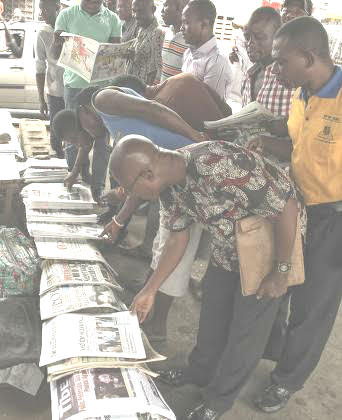
By allcitynews.ng
By allcitynews.ng
The leadership and founder of Centre for the Promotion of Private Enterprise (CPPE), Dr Muda Yusuf has expressed shock at the revelation that the country is losing over $2bn to oil theft and to vandalisation of oil pipes.

Muda who made this known in his monthly review of the performance of second quarter of 2022 GDP said:
The 3.54% GDP growth in the second quarter of 2022 marked the seventh consecutive quarterly GDP growth since the exit from recession in the fourth quarter of 2020.
This report reflects the resilience of the Nigerian economy amid extreme macroeconomic challenges, galloping inflation, currency depreciation, foreign exchange illiquidity, high energy cost, heightened insecurity, weakening purchasing power, structural bottlenecks and trade facilitation issues.

Sectors that posted positive growth
The real sector of the economy grew marginally as agriculture grew by 1.2%; manufacturing 3%; and construction 4.2%. The service sector growth outperformed the real sector, reflecting the sectoral variabilities in the constraints faced by investors in the economy. Road transport for instance grew by 56.4%, which represented the highest sectoral growth. Air transport grew by 22.5%; financial services 20%; ICT 7.71%; trade sector 4.5% and real estate 4.4%. These were the sectors that posted positive growth in the second quarter of this year.
Sectors that Contracted
The NBS report identified the following sectors as having experienced contraction in the second quarter of this year: The highest contraction was in oil refining which was 42%, rail transportation 38%, crude oil and gas 11.8%, metal ores 25.5%, electricity vehicle assemblies 7.8%, electricity and air-conditioning 7%; motion pictures and music 6%, textiles 2.8%. The key drivers of these contractions include the following:
i. The continued inactivity of the country’s major refineries, all of which have been posting losses in recent years.
ii. The cloud of insecurity hovering over the railway system which has caused the suspension of railway services.
iii. Crude oil theft and vandalization of oil facilities in the oil producing areas. By NNPC estimates, the country loses two billion dollars monthly on account of oil theft. Loses are also suffered on account of vandalization of oil facilities, pipelines and the activities of illegal refineries.
iv. Productivity and competitiveness issues continue to impact negatively on the performance across sectors of the economy.
v. The general operating environment continues to be very challenging for most investors. The SMEs were particularly more vulnerable to prevailing macroeconomic shocks, resulting in high mortality rate of small businesses.

Sectors in Recession
Notwithstanding the fact that the Nigerian economy has been out of recession since the fourth quarter of 2020, the following sectors are still in recession: crude oil and gas, oil refining, textiles, electricity, gas and steam engines.
Many businesses are struggling to cope with the numerous challenges and shocks to the economy. On the welfare front, the citizens are also experiencing serious economic hardship as a result of the galloping inflation and the impact on purchasing power.
Meanwhile, the GDP report has further underlined the dominance of the non-oil sector which accounted for 93.67% of the GDP while the oil sector accounted for 6.63%. However, the oil sector continues to play a leading role in the generation of foreign exchange and a significant role in the generation of government revenue. This underscores the persistent productivity challenges which has continued to characterize the non-oil sector of the economy. The non-oil contribution to our export earnings is still less than 5%.
The service sector sustained its dominance in the economy. It contributed 57.4% of the country’s GDP in the second quarter. This highlights the capacity of the sector to cope with the numerous shocks and dislocations that the economy is experiencing. It also underscores the fact that the service sector is less vulnerable to the macroeconomic and structural shocks in the economy. The service sector is able to cope a lot more with these challenges than the real sector of the economy.
Under-Reporting of Maritime Sector Contribution to GDP.

The maritime sector of the economy is a very important sector in the international trade process, playing a very critical role in our import and export trade. It generates appreciable revenue and creates a lot of jobs. It is very critical to the supply chain of the Nigerian economy.
There is evidently a gross under-reporting of the activities of the maritime sector by the National Bureau of Statistics. For instance, in the Q2 GDP report, the maritime sector [water transport] was said to have contributed a mere 2.4 billion Naira to the GDP out of N45.5 trillion GDP for the quarter. This is a contribution of a mere 0.01%. In the first quarter of 2022, the NBS recorded 0% contribution of the sector to GDP. In the GDP numbers, water transport is the only proxy closest to maritime. But maritime sector activities are beyond water transportation.
We therefore appeal to the National Bureau of Statistics to engage with stakeholders in the maritime sector to ensure a proper capturing of the activities of the sector and the contributions of the sector to the national economy. The GDP figures over the years have been grossly under reporting the contribution of maritime to the national economy. This remedy on data quality is critical for planning and investment.

IMPLICATIONS FOR POLICY
SECTORS THAT CONTRACTED OR IN RECCESSION
For sectors that are still in recession, namely, crude oil and gas, electricity and textiles sectors, the following policy options should be considered:
I. Address the challenges of the massive oil theft which is affecting the oil output. The safety of the oil facilities is also very paramount to reverse the under performance of the oil and gas sector. The implementation of the Petroleum industry Act would boost investment in the sector as well.
II. The electricity sector reforms need a review to improve efficiency and productivity in the sector. The challenges in the electricity supply chain needs to be urgently addressed – gas to power, transmission, distribution, energy pricing, metering, and the capacity of the distribution companies. All of these are needed to improve performance and attract more investment into the sector.
III. Need to put fiscal incentives in place to boost investment in renewable energy in line with the energy mix objective of government. Such incentives could be in the areas of tax incentives and the waivers of import duty on renewable energy equipment.
IV. There is an urgent need to decentralize the national grid for ease of management and efficiency. There should also be a deliberate policy to attract private investment in the electricity grid.
V. The textile sector is a victim of the current harsh business climate, especially for the real sector. The key element is the high energy cost, forex illiquidity, currency depreciation and weak domestic patronage. The government should ensure that all uniforms of security agencies and other government institutions are produced from local textile fabrics. Generic issues of high energy cost also need to be addressed.
VI. The rail system needs adequate security to rebound. Government needs to accelerate the security cover for the rail lines and the and the railway transportation system across the country.
VII. There should be an urgent engagement with investors in the auto assembly plants to identify the peculiar challenges facing them. But surely, better patronage of vehicles assembled in Nigeria would have a positive impact on the performance of these firms.
SECTORS THAT POSTED POSITIVE GROWTH
The GDP growth in the major contributors to the GDP were positive but subdued. The growth performance needs to be improved upon to promote inclusion in the growth process.
i. Agricultural sector for instance grew contributes 24% to the GDP but grew by 1.2% in the second quarter of this year. One of the major drawbacks to the sector was the state of insecurity in most farming locations across the country. An improvement in the security situation would surely boost performance of the sector. This would impact on job creation and food security in the country. Better adoption of technology would also add significant value to agriculture. There is a need to improve the efficiency in the entire agricultural value chain – production, processing, transportation, preservation, packaging, marketing etc.
ii. The manufacturing sector grew by 3% in the quarter under review. Capacity utilization is still weak and manufacturers are still grappling with forex and structural issues constraining their productivity. All of these need to be addressed with appropriate government policies.
iii. Across all sectors, there are issues around the high energy cost, the currency depreciation, the soaring inflation, weak purchasing power, forex scarcity and the structural problems of infrastructure. Even though the non-oil sector contributed 93% of the GDP in the period under review, weak productivity remains an issue.










More Stories
How MFM member, Joshua Olusanya, became a World Champion, entered Guinness World Record in Trumpet Playing
NEWS UPDATE @ DAWN, SATURDAY JUNE 21 WITH LINKS, MEANT TO KEEP YOU INFORMED OF SOME TOP & MAJOR NEWSPAPER HEADLINES, WHICH YOU PROBABLY MISSED ON FRIDAY JUNE 20
PenCom intensifying efforts for total compliance with PRA 2014, instructs Newspaper Owners to clear N720m Pension debt